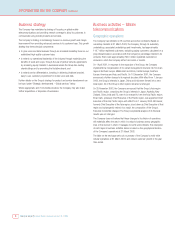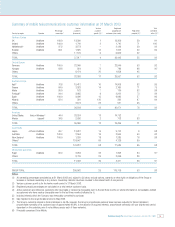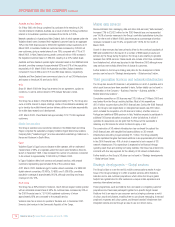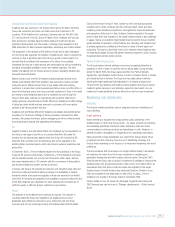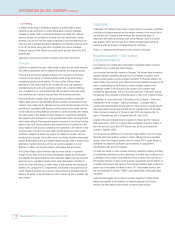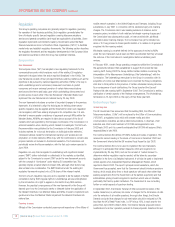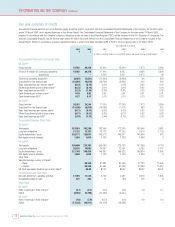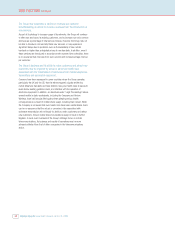Vodafone 2003 Annual Report Download - page 20
Download and view the complete annual report
Please find page 20 of the 2003 Vodafone annual report below. You can navigate through the pages in the report by either clicking on the pages listed below, or by using the keyword search tool below to find specific information within the annual report.
Vodafone Group Plc Annual Report & Accounts and Form 20-F 2003
18
INFORMATION ON THE COMPANY Continued
Regulation
The Group’s operating companies are generally subject to regulation governing
the operation of their business activities. Such regulation generally takes the
form of industry-specific law and regulation covering telecommunications
services and general competition (anti-trust) law applicable to all activities. Some
regulation implements commitments made by Governments under the Basic
Telecommunications Accord of the World Trade Organisation (“WTO”) to facilitate
market entry and establish regulatory frameworks. The following section describes
the regulatory framework and key regulatory developments in the European Union
and selected countries in which the Group has significant interests.
European Union
New framework
The European Union (“EU”) has adopted a new regulatory framework for the
communications sector which replaces much of the existing EU regulatory
framework introduced when the sector was first liberalised in the 1990s. The
new framework consists of four principal Directives outlining matters such as the
objectives to be pursued by national regulatory authorities (“NRAs”), the way in
which undertakings are to be licensed, measures to be taken to protect
consumers and ensure universal provision of certain telecommunications
services and the terms and basis upon which undertakings interconnect and
provide access to each other (“the new framework”). Member States must
implement the new framework into national law by 24 July 2003.
The new framework introduces a number of important changes to the previous
framework. It is intended to align the techniques for defining where sector
specific regulation may be applied and the threshold for when such regulation
can be applied, with those already employed in EU competition law. It is also
intended to ensure greater consistency of approach amongst NRAs within the
Member States. All NRAs are required to take utmost account of the list of
markets which are specified by the European Commission (“the Commission”) in
a Recommendation when deciding which markets to investigate. The first such
Recommendation was published by the Commission in February 2003 and
includes markets for ‘voice call termination on individual mobile networks’,
‘wholesale national market for international roaming’ and ‘access and call
origination’ on mobile networks. NRAs may, with the Commission’s consent, also
propose markets not included in the Recommendation. The Commission will
periodically review the Recommendation, with the first such review expected in
June 2004.
Regulation can only then be applied to undertakings with significant market
power (“SMP”) (either individually or collectively) in the markets so identified,
subject to the Commission’s consent. SMP under the new framework accords
with the concept of “dominance”under existing EU competition law. This
generally implies a market share of at least 40%, although other factors may
also be taken into consideration. The SMP threshold under the existing EU
regulatory framework required only a 25% share of the relevant market.
The form of such regulation may vary and is expected to be the subject of further
consultation during 2003. Appeal rights for undertakings are also strengthened
by the introduction of a right to appeal on the merits of any NRA decision.
However, the practical consequences of the new framework for the Group will
depend upon how the Commission seeks to interpret further the application of
the relevant Directives, how Member States and NRAs choose to implement such
guidance and how the Member States implement the relevant Directives into
national law.
Roaming charges
Officials of the Commission conducted unannounced inspections of the offices of
mobile network operators in the United Kingdom and Germany, including Group
subsidiaries, in July 2001 in connection with its sectoral enquiry into roaming
charges. The Commission said it was seeking evidence of collusion and/or
excessive prices, in relation to both retail and wholesale roaming charges and
the Commission has subsequently sought, or been provided with, additional
information about roaming charges. The Commission has yet to indicate how,
when or if it may proceed in these specific matters or in relation to its general
enquiries into the roaming market.
Wholesale roaming is a market defined for the purposes of review by NRAs
under the new framework but at least one NRA has indicated that they will await
the outcome of the Commission’s investigations before undertaking such
reviews.
In February 2001, certain Group operating companies notified the Commission of
the agreements between them established to support the Eurocall flat rate
roaming tariff. During 2002 the Group clarified certain matters concerning the
interpretation of the Mannesmann Undertakings (“the Undertakings”) with the
Commission. The Undertakings were given by the Group in connection with its
acquisition of control over Mannesmann and concerned the Group’s obligations,
inter alia, to third parties in the provision of certain wholesale roaming services.
As a consequence of such clarifications, the Group launched the Eurocall
Platinum flat rate roaming tariff in September 2002. The Commission is seeking
clarification of certain aspects of the Platinum arrangements. The Undertakings
terminated on 12 April 2003 on the expiry of their three year term.
Northern Europe Region
United Kingdom
The UK Government has announced that the existing NRA, the Office of
Telecommunications, (“Oftel”) will be replaced by the Office of Communications
(“OFCOM”), a regulatory body which will oversee media and other
communications industries as well as telecommunications. A chairman, chief
executive and other board members of OFCOM were appointed in late
2002/early 2003 and it is currently anticipated that OFCOM will assume Oftel’s
responsibilities in late 2003.
The Communications Bill defines OFCOM’s duties and modes of operation. This
received its second reading in the House of Commons in December 2002 and
the Government intends that the Bill receives Royal Assent by July 2003.
The Communications Bill is to be used to implement the new framework,
although it is anticipated that certain measures which are required to be
implemented by 25 July 2003, such as the conduct of ‘market reviews’ to
determine whether regulation may be needed, will be taken by secondary
legislation in the form of a Statutory Instrument. It will also be used to implement
certain aspects of an Independent Spectrum Management Review, which
reported in March 2002. The report’s principal recommendations, which the
Government has accepted, were that the Government should introduce spectrum
trading, which would allow firms to trade spectrum with each other rather than
seeking assignments from the Government, at the earliest opportunity and that
administrative pricing should be applied to spectrum which was not tradable,
particularly that held by public institutions. The Government is now consulting
further on certain aspects of spectrum trading.
In September 2001, the Director General of Oftel concluded his review of the
mobile market and, in particular, his review of charges for the termination of calls
onto the networks of all mobile operators. Amongst other things, the Director
General concluded that charges for call termination should be reduced by 12%
less than the UK’s Retail Prices Index, i.e. RPI minus 12%, in each year for the
period from April 2002 to March 2006. The Director General proposed licence
modifications to all four operators pursuant to these proposals. Vodafone UK and


